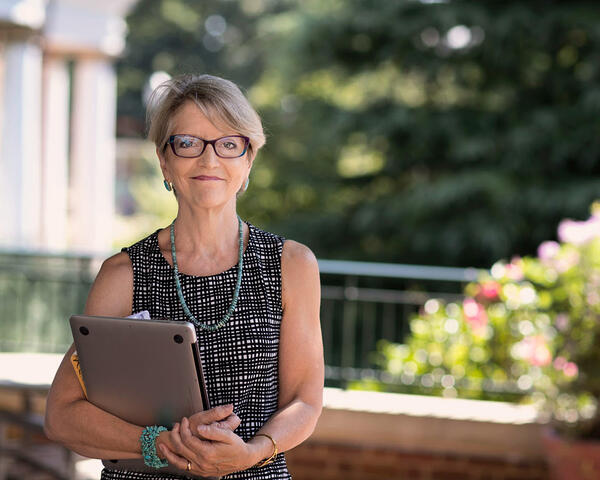 Alison Booth
Alison Booth
Professor of English; Academic Director - Scholars' Lab, University of Virginia Library
Office Hours: Summer: email for appointment. 436 Bryan Hall or Scholars’ Lab, Alderman Library
Class Schedule:
Specialties: 19th C British, Biography, Digital Humanities, Narrative Theory, Textual Studies, Women's Studies
My most recent book is Homes and Haunts: Touring Writers’ Shrines and Countries (Oxford University Press, 2016). This is a transatlantic study of writers’ house museums and narratives of pilgrimage in the nineteenth and early twentieth centuries. A new project on the Anne Spencer House and Garden Museum unites my expertise on biographical house museums and women writers with the resources of University of Virginia's Special Collections, and "Spatial Tech" and R&D staff in the Scholars' Lab. This leading digital humanities (DH) group has welcomed and spurred on my effort to unite feminist cultural studies, social justice advocacy, technological experiment, and collaborative research and pedagogy. It is inspiring and challenging to unite my humanities scholarship with co-directing a center in a research library.
A continuing theme in my books and articles has been the reception history of authors and the construction of collective biographical histories, or prosopographies. This theme informed my first book, Greatness Engendered: George Eliot and Virginia Woolf (Cornell University Press, 1992; reprinted in Cornell Open Access or print on demand, 2019), a pioneering consideration of Woolf's roots in Victorian fiction, biography, and historiography, and an influential study of gender and narrative persona. This book anticipates my attention to representative personae, uniting feminist studies with the growing influence of cultural studies over the decades. These interests have meshed with my research on memorials and monuments such as Mount Rushmore and the narratives of travel and tourism, museums, and biography.
I have persistently worked across the boundaries of period (nineteenth to twentieth centuries), nationality (particularly transatlantic Anglophone), media and audience (word-image, novel and film, celebrity and popular culture). In my teaching, research, and organization of events, I strive toward public humanities, studies of African American women's biography, working with faculty and students of HBCUs, and interdisciplinary collaborations such as hackathons or the Feminist DH@UVA symposia in 2018 and 2019. My work in narrative theory has focused on life writing and the prevalent form of collections of short biographies (prosopographies), concentrated in my bibliography of collective biographies of women and the related book, How to Make It as a Woman: Collective Biographical History from Victoria to the Present (University of Chicago Press, 2004). The University of Virginia Library and E-Text Center produced the annotated bibliography as an online extension of the book; I worked with developers and Scholars' Lab staff (from 2006) to enhance the project's searching, visualizations, and data: Collective Biographies of Women: An Annotated Bibliography; it was peer-reviewed and accepted by NINES in 2007.
Since then, the project has evolved with the help of English graduate research assistants and a 2010-2012 Residential Fellowship in the Institute for Advanced Technology in the Humanities and their expert collaboration. The XML bibliography was incorporated in a relational database, and we developed Biographical Elements and Structure Schema (BESS) for comparative analysis of versions of one person's life or short biographies in various types of collection. Supported by an ACLS Digital Fellowship in 2014 and an NEH Startup Grant in 2015-2017, Collective Biographies of Women is a resource for studying interconnected lives of more than 8000 women, with publication data and links to online text of more than 12,000 books; CBW offers insights into the gender ideology and conventions of biography across more than a century. For my many collaborators, see http://cbw.iath.virginia.edu/people.php .
In 2017-2020, I co-direct the Humanities Informatics Lab with Debjani Ganguly and Jack Chen, a research group with four workshops exploring intersections of data, methodology, and humanities: Network/Corpus (social and text-based DH); Smart Environments; War and Surveillance; Human/Machine Intelligence. Strategic Initiative Fund project with outcomes in conferences, reading groups and publications, and grants.
I co-designed and launched the Graduate Certificate in Digital Humanities at the University of Virginia in 2018, and I chair the Faculty Advisory Committee for the certificate. I have advised dissertations and theses and served on committees in a wide range of periods and approaches (e.g. gender and economics; law; home theatricals; Gaskell; Brontes; Edith Wharton; Virginia Woolf; Victorian ghost stories; medievalism; Romanticism; modernist periodicals; world literature and Twitter; Latin American detective fiction; Tibetan hagiography; French digital humanities). Recent graduate and undergraduate courses have included Digital Literary Studies, Introduction to DH, Narrative and Travel, Bicentennial Austen, Gothic, Space and Narrative.
DEGREES
- Ph.D. Princeton, 1986
- M.A. Princeton, 1983
- M.F.A. Cornell, 1979
- B.A. Bennington, 1976
AWARDS AND GRANTS
- https://news.virginia.edu/content/new-grant-boosts-unique-digital-humanities-platform
- NEH Level II Start-up Grant, Office of Digital Humanities: Cohorts of Women in Biographical Collections. Daniel Pitti and Worthy Martin, Co-PIs. 2015-2016.
- ACLS Digital Innovation Fellowship and Sesquicentennial Fellowship: Jan.-Dec. 2014. Sabbatical salary and project costs.
- Resident Fellow, Institute for Advanced Technology in the Humanities, 2010-2012
- Barbara Penny Kanner Award for Bibliomethodology, Western Association of Women Historians, for How to Make It as a Woman.
- Fellow, Virginia Center for the Humanities, 1993.
